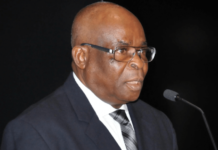 |
| Adesuwa Tsan |
The two chambers of the National Assembly are presently working assiduously on the details of the 2017 Appropriations Bill after debate on its merits and general principles during its second reading.
To ensure there are no distractions while the lawmakers carry out this task, the Speaker of the House of Representatives, Rt. Hon Yakubu Dogara, adjourned plenary for three weeks for committees to dedicate themselves to perusing the nitty gritty of the budget and produce a document that will impact on the lives of Nigerians.
While it is not unusual to adjourn sitting for committees to work on the budget, what makes this particular one different is that the reforms which the Speaker introduced to the budget will be implemented in the 2017 budget document to make it more transparent and people oriented in accordance with the 8th Assembly’s Legislative Agenda introduced by the Speaker.
Last year, Dogara had promised to introduce a series of reforms to the budgeting process to ensure that there is more citizen participation, more disclosure on the details of the budget and to make it more responsive to the need of Nigerians, among others.
In keeping to his promise, the Speaker reminded his colleagues right on their first sitting day in 2017 that they should all up brace to embrace the budget reforms and ensure that it is implemented to the fullest.
Thus, in his speech at the resumption of the House on January 10th, the Speaker said, “We pledge to reform the budget process. To this end therefore, we would ensure that the procedure and process of consideration and passage of the 2017 Budget is transparent, inclusive and professionally handled. The details of the Budget should be debated and passed in Plenary to avoid those needless pitfalls that normally characterize the budget process.”
To underscore the importance of the reforms, the speaker set up a House Budget Reform Committee to ensure that the listed objectives are met.
He explained that the committee would “undertake a thorough and holistic review of all issues relating to the Budget to ensure due process, more transparency, better accountability, openness and value for money. This Committee will comprise experts and professional organisations and will work in liaison with the Senate and the Executive branch.”
The reforms, aimed at producing, in the words of Dogara, a ”realistic, credible and lasting Budget Reform process,” will involve amending some sections of the Nigerian Constitution, such as section 318, to clearly define the financial year through which the budget must run through to ensure that its full 12 months course is completed and Section 81(1), which gives the President authority to present the estimates of revenue and expenditure ‘at any time’ within a financial year.
Dogara explained, “this is due to the imperative necessity to ensure that the budget is passed on time, before the commencement of the next financial year. This may, if necessary, require that a budget time frame be included in the Constitution to bind both The Executive and Legislature,” he added.

(adsbygoogle = window.adsbygoogle || []).push({});
More importantly, to avoid distortion of facts concerning “insertion of projects in the budget” by members of the National Assembly who want their constituencies to benefit from the budget, Dogara moved for an extensive stakeholder consultation at the executive level during preparation of the Budget so that both the legislators and members of the executive are aware of projects that are reflected in the budget accordingly.
The Speaker noted that, “there must be a robust pre-budget interface between the Executive and Legislature, to reduce areas of friction during the Appropriation process. Indeed, the National Assembly should be consulted on issues of project selection. In any case, even though there is both constitutional and practical need and imperative for the National Assembly to work in a cooperative manner with the Executive on Budgeting matters, nevertheless, it cannot give up its constitutionally assigned responsibilities in the budget process in the guise of seeking cooperation with the Executive branch. The watchword is cooperation not abdication.”
He continued, “Projects that are admitted to the National Budget are not properly thought through and based on actual need with relevant spread to reflect federal character of Nigeria. This entails that project selection process must be more transparent, need based and technically driven with justification. Discretionary and whimsical selection of projects must be downplayed.”
On transparency of the process among the lawmakers, he assured that the reform of the process of the passage of the Appropriation Act in the National Assembly will ensure “more openness and transparency, especially at the Committee levels. The plenary of both House should be more involved in the Schedule to the Appropriation Act.”
In recognition of the need for capacity building for all parties involved in the budgetary process, Dogara moved that the technical capacity of both the bureaucracy and members of both the executive and legislative branch on budget matters is deliberately beefed up. He said, “We must as a legislature ensure during this session that the National Assembly Budget and Research Office, Bill (NABRO) is finally passed and signed into Law, to provide timely and accurate financial and economic information to the Legislature.”
For stakeholders outside the National Assembly, Dogara is ensuring that they will be part of the process in a form of public hearing. “Subjecting the annual budget to public scrutiny at National Assembly will give stakeholders opportunity to make their inputs and challenge incorrect assumptions in the Budget. This process will involve the Civil Society Organisations (CSOs) and other professional bodies. The National Assembly will benefit from the research skills of various CSOs and the technical expertise of professional bodies at the enactment stage of the Appropriation Bill. I am aware that many CSOs scrutinise the Budget yearly and usually point out areas of duplications and wastages. We need to institutionalise this mechanism,” he stated.
(adsbygoogle = window.adsbygoogle || []).push({});
After directing that public hearing be held on the budget, in addition to the budget defence exercise by various Committees for Ministries, Departments and Agencies of government, the Speaker also directed that the Report of the Committees decisions on the Budget is endorsed by at least 2/3rd of members respectively to foster inclusion.
While the committees of the House continue with oversight visits of the various ministries, departments and agencies of government with a view to appraising the performance of the 2016 budget and conduct of budget defense of the 2017 budget, it is safe to state that the reforms applied in the 2017 budget preparation by the House of Representatives will make it one of the best copies ever produced.
“We must brace up and work assiduously and conscientiously to give Nigerians a budget that will not only lift us out of recession but kick start the needed expeditious journey into Nigeria’s prosperity. We pledge to reform the budget process. To this end therefore, we would ensure that the procedure and process of consideration and passage of the 2017 Budget is transparent, inclusive and professionally handled. The details of the Budget should be debated and passed in Plenary to avoid those needless pitfalls that normally characterize the budget process,” Dogara charged.
Adesuwa Tsan is Chief Press Secretary to Speaker Yakubu Dogara and tweets via @TsanAdesuwa
(adsbygoogle = window.adsbygoogle || []).push({});










